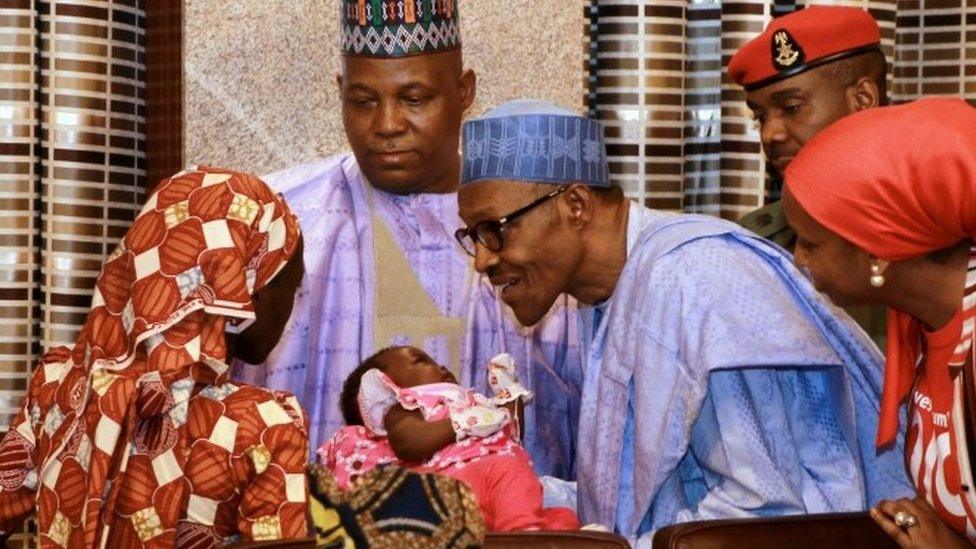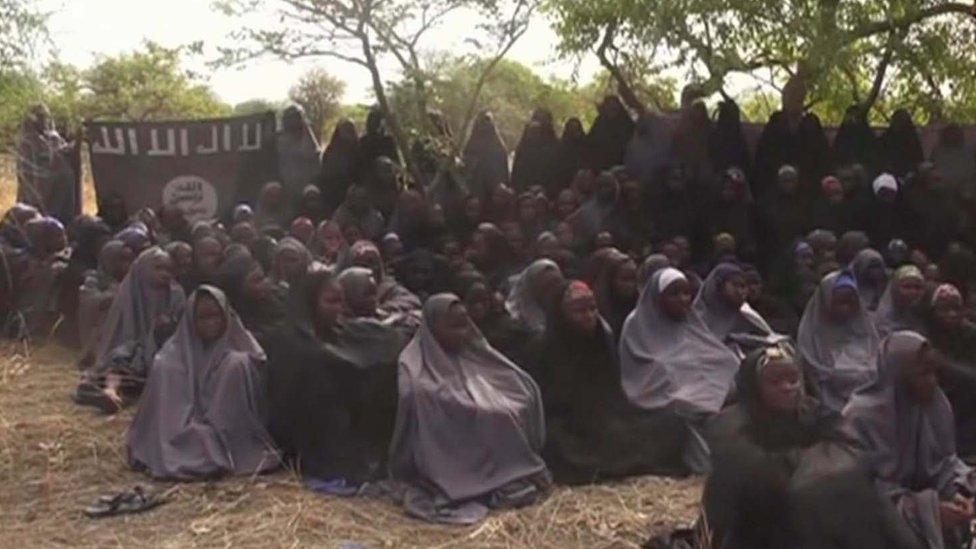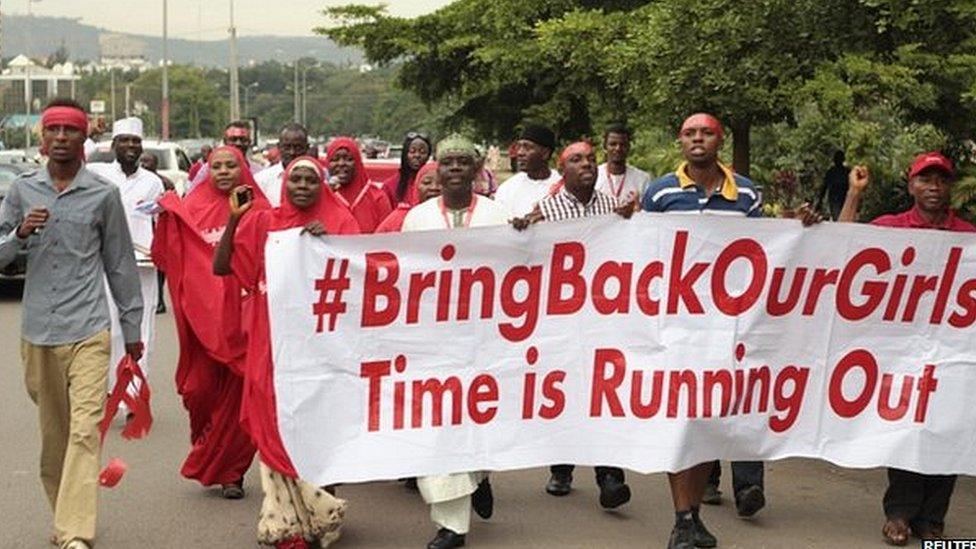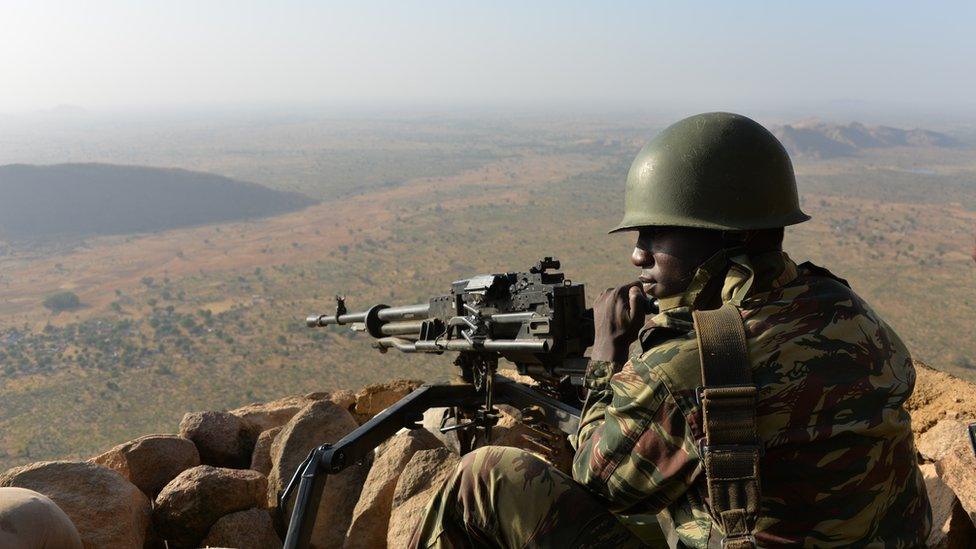Chibok girl's life with Boko Haram in Nigeria
- Published

The first rescued Chibok girl showed her child to President Buhari
A month ago, the first of a group of more than 200 schoolgirls kidnapped from Chibok was freed in north-eastern Nigeria after two years in the hands of Islamist militant group Boko Haram.
The girl gained widespread coverage when she was taken to meet President Muhammadu Buhari.
Her brother, who was overwhelmed to be reunited with his sister, was told to return home by state officials during the visit and says he now has no idea of the whereabouts of her or their mother, who accompanied them.
Yakubu Nkeki, a spokesman for the parents of the missing Chibok schoolgirls, and a close friend of the girl, says he has known her since childhood and he too hasn't had contact with her since her visit to meet the president.
He told the BBC how, after she was first released, they sat together for hours and she recounted her ordeal from the very beginning.

Kidnap
While describing how she was taken from her school in Chibok town, she laughed, something Mr Nkeki says he found very out of place.

"After they were taken from the school," he tells me, "they were put in one place as a large group but after a few weeks they were taken further into the Sambisa Forest. There, some of the larger girls were forced to marry the militants, but at that time she was not given up for marriage because she was seen as a small girl."
She was terrified at the thought of being forced to marry someone she did not know or love but she was also relieved that she had been spared.
She spoke of the many military airstrikes on the Boko Haram fighters which meant the group had to move around often to avoid detection. The girls were then split into smaller groups and moved to different locations.

'Marriage'
She was in a group of about six girls, and they were taken to a big building surrounded by a large fence without an entrance.
"They had to climb over with a ladder to get in but once in they had no way of getting out again," Mr Nkeki said.

Boko Haram released a video of the girls shortly after they were kidnapped in April 2014
"By this time, the girls had been mixed up with other girls who had been captured. They could not understand each other because they all spoke different languages."
She said that after about six months in the building, her worst fears came true when she was forced to marry one of the Boko Haram militants. The man told her that he had also been abducted from the town of Mubi and fored to become a fighter.
The building didn't have any food in it apart from a large bag of maize which they soaked in water and then ate raw. Later they found a large stone which they used to grind the maize and for vegetables, they opted for leaves from the trees.

Prayers
Soon afterwards, the men started going out to raid other villages for food, cooking utensils and household items.
She told Mr Nkeki that one day the group heard a loud blast outside. It was an explosion that made a huge hole in the fence and some of the girls saw a chance to escape and ran into the thick forest nearby.
Inside abducted Chibok girls' school
This was not a good move because many Boko Haram militants were camped there and many of those who ran away were eventually caught.
Now married to one of the militants, she said she could not escape. She said she feared she would never see her mother again and whenever she was alone she would spend up to an hour on her knees, praying that she would be rescued.
Although she told her captors that she had accepted their religion, inwardly she held on to her Christian faith.
She knew what could happen to her if she did otherwise, as she had witnessed the gruesome killing of another girl for refusing to convert to Islam. The militants buried her waist-deep in the ground and the other captives were made to stone her to death.
"Boko Haram drove them to another part of Sambisa Forest," continues Mr Nkeki. "The girl lived with her husband and he found grass to make a thatched shelter for them in the forest.
Now there were only three Chibok girls left in the group because the other three were lost, possibly killed in military attacks. She said that in that area there were many groups of militant fighters and large numbers of women and children with them.

Escape
There were more airstrikes and many of the Boko Haram fighters were killed so her husband said he was no longer willing to continue fighting. By this time she had had a baby. That's when she and her husband decided to escape.
She had gained trust in him, believed he wasn't like the other Boko Haram members and she became confident enough to leave with him. They walked for two days before arriving in a village called Bali.

The campaign for the release of the schoolgirls went global
This was their first contact with the outside world, free from Boko Haram control.
The villagers there were mostly women and children and her husband, who was the only young man around, looked out of place.
He became afraid of being caught so he decided to go and hide in the bush. They stayed in the area for two to three weeks until some vigilantes arrived and asked her if there were any people who had just arrived in the village. She told them she was among the girls taken from Chibok.
She also told them where her husband was hiding, so they took them and the baby to her home and she could finally see her family again.
"Mum, is this really you?" she cried as she was reunited with her mother.
Nineteen other parents did not live to see if their own girls would also be freed, some died in Boko Haram attacks and others from suspected stress-related complications.

The Boko Haram insurgency has also affected Nigeria's neighbours
The girl is believed to now be undergoing rehabilitation and debriefing sessions with intelligence agencies to help provide them with information. She has asked them not to harm her husband, as she considers him a good man.
Military spokesman General Rabe Abubakar said she was being well looked after.
"Nobody is hiding anybody, we have to safeguard her and give her all the necessary security to recuperate well. As soon as everything is sorted out, she will be made accessible," he told the Associated Press.
Since being rescued, the girl has had little access to the outside world, so right now she might not have the freedom she anticipated but after two years in the hands of Boko Haram, it is freedom nonetheless.
More about the Chibok girls:

Boko Haram at a glance:
Founded in 2002, initially focused on opposing Western-style education - Boko Haram means "Western education is forbidden" in the Hausa language
Launched military operations in 2009
Thousands killed, mostly in north-eastern Nigeria, and hundreds abducted
Joined so-called Islamic State, now calls itself IS's "West African province"
Seized large area in north-east, where it declared caliphate
Regional force has now retaken most of that territory